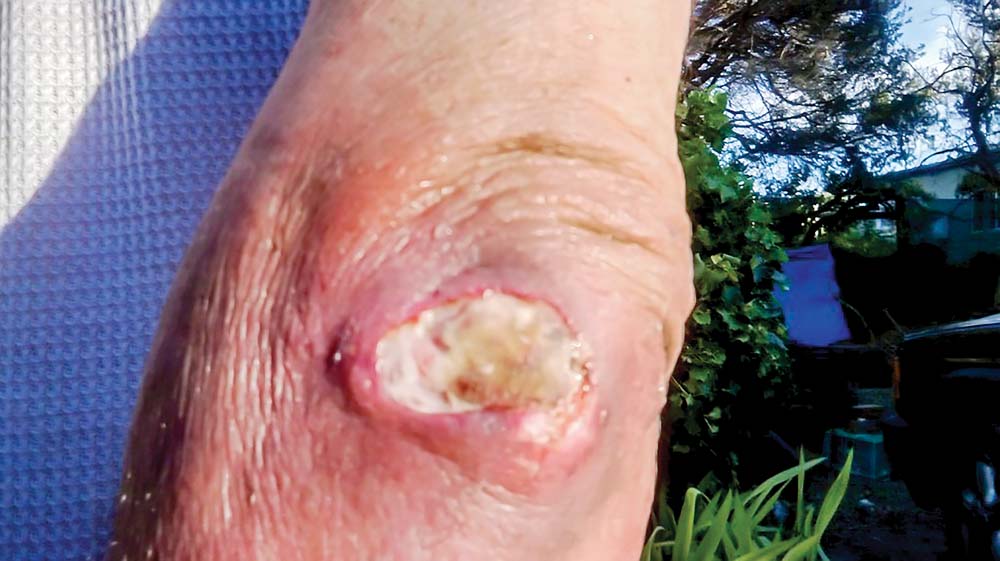FEARS over the environmental effects of using chemicals to kill mosquitos have raised questions about the methods being used on the Mornington Peninsula to investigate the flesh-eating Buruli ulcer.
The Beating Buruli in Victoria: Mosquito Control Study was launched on the back of a $2.4 million federal government grant announced by Flinders MP and Health Minister Greg Hunt in September 2017 to “get to the bottom” of the causes of the ulcer.
Increasing numbers of Buruli ulcer cases are being reported, mainly on the Mornington and Bellarine peninsulas, but also extending as far north along the coast of Port Phillip to Sandringham.
Scientists suspect the ulcer is caused by a bacterium which infects humans bitten by a mosquito.
A scientist not involved in the study doubts that its methods would “pass the usual university research ethics committee approval”.
There are also growing fears that the chemicals being used to kill mosquitos will poison other insects, including bees, and creatures that eat them.
Shire councillors were told last week that there is a “paucity of information” confirming mosquitos were to blame for Buruli ulcers.
The effectiveness of efforts to run trials to control mosquitos could be jeopardised by the number of residents deciding to opt out of the study being run by the Department of Health and Human Services (DHHS), the Doherty Institute, Barwon Health, Austin Health, CSIRO, Agriculture Victoria, The University of Melbourne and Mornington Peninsula Shire.
More than 10,000 signatures have been added to an online petition protesting at the use of chemicals to kill the mosquitos and the study managers say residents can choose not to be involved.
“When the government money was made available it was called a study, now it’s more like a trial,” the mayor Cr David Gill said last week.
His comments followed confirmation that in March properties in three streets in Rye were sprayed with a chemical to kill mosquitos. Those streets were the first of 76 locations selected for the study.
Cr Gill says the federal government is not keeping a close enough watch on how the money announced by Mr Hunt is being spent.
On Friday he questioned whether the government normally makes large grants to other levels of government “without knowing how it is going to be used?”
“I would find that very unusual,” Cr Gill said.
He said councillors were not involved in any decisions connected with the study “and I’m very disappointed there has been no proper public consultation or an effort to carry out an environmental effects study”.
Councillors last week called for a report from CEO John Baker on the impact of poisoning mosquitos in areas of Rye, Sorrento, Blairgowrie, and Tootgarook “on the community, flora, fauna and environment of such areas”.
The motion moved by Cr Hugh Fraser said there was a “paucity of information that confirms mosquitoes are the vector or cause of the infections”.
Residents were concerned that “the broad use of chemical sprays appears to be very drastic action and a disproportionate response…”
On Saturday, Cr Gill circulated an email containing opinions he attributed to a scientist “who prefers to be unnamed for professional purposes”.
The scientist called the study “an experiment” being done outside of an “established protocol for dealing with infectious diseases problems”.
Asked by The News if chemicals in water, sprayed or “fogged”, to control mosquitos was the type of “research” he envisaged when announcing the federal grant, Mr Hunt said it was “vital” to find out about the causes of this “horrible and painful medical condition”.
“It is my hope that the Victorian government listens to the community to provide an effective study into the cause of the ulcer, as well as inform the local community on the scope of measures which will be undertaken, with appropriate measures taken to assist those who do not wish to participate,” Mr Hunt said.
The unnamed scientist quoted by Cr Gill said other scientists were also concerned with how the Buruli ulcer study was being undertaken.
“I suggest that [the shire] request that a technical paper suitable for peer scrutiny be produced … rather than a blanket statement to the general public,” the scientist stated.
“For ethical experimental work a real ‘opt out’ option should be in place, otherwise a research experiment would not be expected to pass the usual university research ethics committee approval.
“This pathway seems to have been avoided with the involvement of health department powers over known infectious diseases processes, such as typhoid outbreaks, where overriding powers are approved.
“If your street is sprayed, how can you have an ‘opt out’ option? Conversely, if people do have a real ‘’opt out’’ option the experimental design would appear to be compromised.”
According to the DHHS there were no objections in March from residents when “a pilot spraying program using a residual pesticide” was undertaken in French, Dawn and Goyarra streets, Rye.
The “trial” involved spraying trees, bushes and fences along the roads and nature strips with the “barrier spray” bifenthrin.
In a letter to councillors, Blairgowrie resident Judy Muir reminded them that Argentine ants were once sprayed with the suspected carcinogen dieldrin.
“Hindsight is indeed insightful,” Ms Muir said.
She said a “precautionary approach is absolutely necessary before spraying” and asked councillors to “consider most carefully all aspects of random, unscientific trials on both our environment and those who live and visit here”.
First published in the Southern Peninsula News – 30 July 2019


